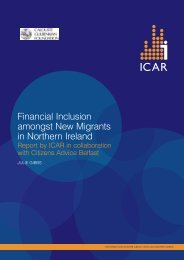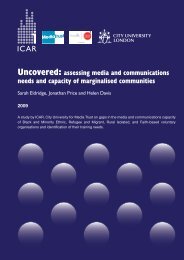The Somali community in the UK: What we know and how we ... - ICAR
The Somali community in the UK: What we know and how we ... - ICAR
The Somali community in the UK: What we know and how we ... - ICAR
Create successful ePaper yourself
Turn your PDF publications into a flip-book with our unique Google optimized e-Paper software.
anyth<strong>in</strong>g, for her or <strong>the</strong> children” (2002: 110).<br />
O<strong>the</strong>r men take a more pragmatic stance, argu<strong>in</strong>g<br />
not only for more employment opportunities, but<br />
for a better deal from <strong>the</strong> <strong>we</strong>lfare state, <strong>and</strong> look<br />
to take advantage of <strong>the</strong> benefits on offer (Dench,<br />
1994: 35-40).<br />
Nei<strong>the</strong>r is <strong>the</strong>re a clear female response. <strong>The</strong>re<br />
are those older women who lament what <strong>the</strong>y see<br />
as <strong>the</strong> lack of respect for men <strong>in</strong> British culture<br />
as a recipe for family breakdown - much younger<br />
women brought up <strong>in</strong> <strong>the</strong> <strong>UK</strong> may th<strong>in</strong>k less about<br />
<strong>the</strong> importance of male control. But an <strong>in</strong>terest<strong>in</strong>g<br />
study by Emua Ali (2001) s<strong>how</strong>s that <strong>the</strong>re is no<br />
neat fit bet<strong>we</strong>en educational level <strong>and</strong> views on<br />
gender relations. In her study of 50 women, some<br />
highly educated women resisted <strong>the</strong> concept of<br />
<strong>the</strong>ir equality with men. In practice, familial control<br />
of marriage is dim<strong>in</strong>ish<strong>in</strong>g, <strong>and</strong> Ali found that those<br />
with fur<strong>the</strong>r <strong>and</strong> higher education tended to<br />
support women’s <strong>in</strong>dependent choice of partner.<br />
Never<strong>the</strong>less, ambiguity rema<strong>in</strong>s: <strong>the</strong> 38% of <strong>the</strong><br />
sample who argued for arranged marriage <strong>in</strong>cluded<br />
all educational levels, from illiterates to graduates,<br />
<strong>and</strong> <strong>the</strong> majority of women seek<strong>in</strong>g more<br />
autonomy had little formal education.<br />
British culture can <strong>in</strong>fluence but not override,<br />
<strong>and</strong> <strong>Somali</strong> norms still heavily <strong>in</strong>fluence marriage.<br />
Women will not marry as young as <strong>the</strong>y might <strong>in</strong><br />
<strong>Somali</strong>a where teenage brides are common. But<br />
s<strong>in</strong>gle women over thirty who have chosen to<br />
devote <strong>the</strong>ir time to <strong>the</strong>ir career say that <strong>the</strong>ir<br />
chances of f<strong>in</strong>d<strong>in</strong>g a husb<strong>and</strong> are now virtually<br />
closed. As for <strong>the</strong> selection of a partner, <strong>in</strong> <strong>the</strong><br />
British context of a dispersed <strong>community</strong> <strong>and</strong><br />
fragmented families, parental choice of spouse may<br />
be reduced to necessary approval, but complete<br />
<strong>in</strong>dependence <strong>in</strong> this matter has not replaced family<br />
arrangements. It is not acceptable <strong>in</strong> Islam for men<br />
<strong>and</strong> women to mix freely toge<strong>the</strong>r; only a small<br />
m<strong>in</strong>ority of young people <strong>in</strong>tervie<strong>we</strong>d by Berns<br />
McGown (1999) would go clubb<strong>in</strong>g with <strong>the</strong>ir<br />
British peers. <strong>Somali</strong> Nuptials is an <strong>in</strong>troduction<br />
agency which recognises that “<strong>in</strong> our <strong>community</strong><br />
<strong>we</strong> lack meet<strong>in</strong>g places or events where <strong>we</strong> could<br />
meet a potential partner (religion be<strong>in</strong>g among<br />
one [sic] of <strong>the</strong> reasons)” 142 . But at <strong>the</strong> same time<br />
<strong>in</strong>dependent romantic courtship is condemned.<br />
Dat<strong>in</strong>g or:<br />
Go<strong>in</strong>g out with one ano<strong>the</strong>r for a period of<br />
time is quite haraam [prohibited] <strong>in</strong> our religion<br />
(Islam). <strong>Somali</strong> Nuptials does not condone<br />
long term relationship (dat<strong>in</strong>g without <strong>the</strong><br />
<strong>in</strong>tention of marriage) after meet<strong>in</strong>g with one<br />
ano<strong>the</strong>r. 143<br />
It might seem surpris<strong>in</strong>g that <strong>in</strong> Ali’s sample <strong>the</strong><br />
majority of those who disapproved of boyfriends<br />
had higher education, <strong>and</strong> <strong>the</strong>refore potential<br />
access to employment. But <strong>in</strong> tackl<strong>in</strong>g <strong>the</strong> question<br />
of <strong>how</strong> far emigration has been a liberat<strong>in</strong>g<br />
experience for <strong>Somali</strong> women, <strong>we</strong> must th<strong>in</strong>k<br />
beyond <strong>the</strong> <strong>we</strong>stern model of a congruence<br />
bet<strong>we</strong>en economic <strong>in</strong>dependence <strong>and</strong> freedoms<br />
of sexuality <strong>and</strong> style. ‘Autonomy’ amounts to a<br />
woman’s control over key aspects of her life, <strong>and</strong><br />
<strong>the</strong>se will be culturally specific. A choice to <strong>we</strong>ar<br />
<strong>the</strong> hijab (headscarf) <strong>and</strong> observe Muslim prayer<br />
times can evidence confidence <strong>and</strong> self-assertion<br />
as much as would a decision to reject <strong>the</strong>m. In<br />
Break<strong>in</strong>g <strong>the</strong> silence (2003: 15) Safya says:<br />
I’ve seen both sides of this life from when I left<br />
<strong>Somali</strong>a. I’ve seen life from <strong>in</strong>side my Western<br />
clo<strong>the</strong>s <strong>and</strong> short skirts. Those Western clo<strong>the</strong>s<br />
gave me an advantage here. I blended <strong>in</strong>…. I<br />
dress differently now. I go <strong>in</strong>to my Hijabo, <strong>and</strong><br />
I see a different side of life. I study <strong>the</strong> Islamic<br />
viewpo<strong>in</strong>t. I dress modestly, with a long skirt….<br />
People are suspicious of me now. People look<br />
down on me. I’ve been rejected for jobs s<strong>in</strong>ce<br />
hav<strong>in</strong>g <strong>the</strong> Hijabo. I’m sure rejection comes with<br />
my change of dress.… I don’t care. I’m fac<strong>in</strong>g<br />
<strong>the</strong> world now…. Your judgement won’t change<br />
my life! I accept my own struggle! <strong>What</strong>’s<br />
important is my faith. I feel stronger now I have<br />
<strong>the</strong> Hijabo. My th<strong>in</strong>k<strong>in</strong>g does not divide me. I<br />
am strong.<br />
Here, Safya has traded convenience for <strong>the</strong> security<br />
of existential <strong>in</strong>tegrity. In her study of Muslims<br />
<strong>in</strong> <strong>the</strong> diaspora (1999), Berns McGown found<br />
many young <strong>Somali</strong> women <strong>in</strong> London are turn<strong>in</strong>g<br />
towards <strong>the</strong>ir religion to confirm <strong>the</strong>ir diaspora<br />
identity. This does not mean a retreat <strong>in</strong>to rigid<br />
rules or an Islamic ghetto, but a constant “<strong>we</strong>av<strong>in</strong>g<br />
64 <strong>The</strong> <strong>Somali</strong> <strong>community</strong> <strong>in</strong> <strong>the</strong> <strong>UK</strong>

















